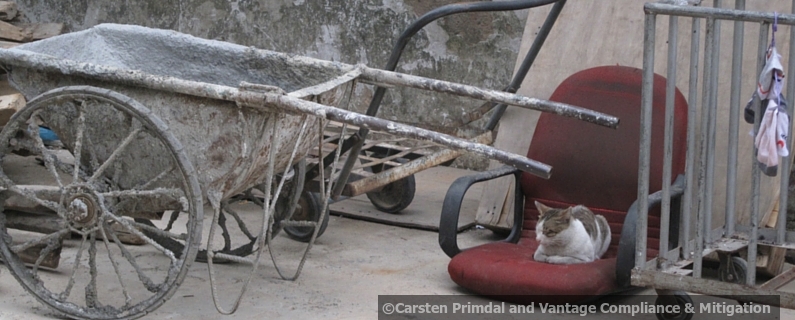You may not have heard of Dora the Explorer®, but if any aspect of your supply chains run through China, you and she share a common experience: working through a maze of puzzles and riddles to:
(in Dora’s case) learn something new, and (in your case) ensure that your Chinese-factory manufactured products are safe and ethically produced.
Earlier this month, boxes of Dora the Explorer® crayons were found to have traces of asbestos embedded in the wax. Crayon boxes with images of Peppa the Pig® and Mickey Mouse® also contained the contaminated toys. Anyone who has a box of these crayons needs to return to the store from which they bought it.
The crayons illustrate a challenge that exists for every manufacturer of goods that are sourced, or have supply chains, in China. The country’s explosive industrial growth over the past 30 years has not always been matched by quality standards or ethical actions on the part of many of those industrial leaders. International corporations who access the lucrative offshore production hub assume a risk that the factories with which they do business may not remain in contract compliance over time.
A common occurrence is the exchange by the factory of contract-mandated high-quality materials for lower quality materials, to reduce costs and increase profits. The sub-quality products are then shipped to the distributing country where they are sold to consumers. If/when the defective aspect is discovered, it is the reputation of the international manufacturer that takes the hit, not the Chinese factory.
The UK-based Primark retail chain offers a nasty example. A part of the Associated British Foods conglomerate with stores across Europe, Primark sources its supplies from 600 suppliers in 16 countries, including China. In 2005, it was ranked lowest of leading clothing chains on the Ethical Trade Index, based on its lax recognition of workers rights and the fact it routinely did business with oppressive regimes. Despite efforts to rehabilitate its reputation, in 2008, the corporation was again revealed to be using “sweat shop” and child labour in India and Bangladesh. This led to a mass boycott and major criticism from NGO’s, charities, media and, most importantly, their own customers. In response, the company made major revisions to how it does business overseas and appointed an Ethical Trade Director to oversee audits on supply chain factories. In 2011, the company was able to open new stores, which demonstrated that it was slowly regaining its lost reputation.
The Primark case reveals the threat posed to every off-shore manufacturer. A recent review of unsafe products sold in Europe indicated that 64% of the product recalls issued by the 31 member states of the European Union were on products that originated in China. The products demonstrated failures in functionality (not working the way that was promised), unethical manufacturing conditions (such as presence of child or forced labor) and environmental practices (polluting) that just don’t sit well with the end consumer – your client.
The effect on corporate health of product problems (in materials and/or manufacturing processes) can be short term and long term:
Short term:
Your customers might choose to buy from a rival, costing you immediate sales. If changes aren’t made and reported, that customer may become a “former” customer. Products with high safety challenges may be recalled, requiring refunds to your customers, pulling the product from shelves (losing that investment), and potential spending additional costs for re-works or destruction costs.
The asbestos-laced crayons were not recalled, but their cost will be refunded. Nanna’s Berries, on the other hand, which in early 2015 were found to carry the Hepatitis A virus, have been recalled, at great expense to their producer. Both the berries and the crayons were sourced at least partly in China.
Long term:
Without significant remedial efforts, your product and corporate reputation may be so tarnished that your company cannot survive the fallout from revelations of unethical production practices. Your customers need your products to be clear of all material or production practice challenges to remain loyal to your brand.
The crayon case hits very close to home for me – twelve years ago, my father passed away from complications of mesothelioma (a cancer caused by asbestos exposure). He had not been exposed to asbestos (that he was aware of), so the cause was a surprise that made his condition that much harder to manage. The current claim is that the asbestos in the crayons does not pose an immediate threat to children, but why would a parent take the chance and keep them in the house?
As the “parent” of your products and as the guardian of your brand, keeping your customers safe and happy by avoiding manufacturing failures such as poor materials and unethical practices must take first priority.
To review potential risks in your supply chains contact me today.
If you would like to know more, you can also download a free report “8 Problems Businesses face when sourcing from China here.
https://vantagecompliance.com/8-problems-businesses-face-when-sourcing-goods-from-china-bg/
This blog was written by Carsten Primdal, an independent consultant who helps businesses that have manufacturing done overseas – especially in China – to minimize supply chain risk.Drawing on years of on-the-ground experience and a strong understanding of the cultural and commercial context, Carsten is passionate about helping his clients gain greater control over the risks most companies face knowingly or unknowingly.
Urgent issues? Questions? Concerns? If you are considering/already buying from Chinese factories and would like more information, please feel free to contact us for an obligation free talk.
I can be reached at carsten@vantagecompliance.com or on (+61) 413 089 020
You may also like to read some of my other blogs. They can be found here:
Tenacity and Communications Reduce Risk of Chinese Child Labour Law Violations
Safety Study Identifies Chinese Supply Factory Risks
China Manufacturing Industry Challenges Trigger Inspections, Consequences
Risk Mitigation Can Prevent Chinese Supply Chain Disruption
Tips and Traps of Contracting in China
Keeping Your Supply Chain Green: Avoiding the Environmental Polluters when sourcing in China
Ensure Timely Contract Compliance with a Chinese Supply Chain Expert
Two Key Questions To Answer Before Onboarding Your Chinese Manufacturing Supplier
Off-Shore Manufacturer’s Certificates Require Credibility
Factory Planning Principles Improve Supply Chain Quality
Mitigating Risk of Quality Fade in Overseas Manufacturing Facilities
How to Assure your “Green” Supply Chain in China
ChAFTA Opens Doors for increase in China-Australia Business relations
China Verification for Your Manufacturing Supplier Needs
Australian Industry Agreements Encourage More Chinese Factory Verifications
China Factory Verification: Check Before You Buy
Frozen berry recall highlights potential supply chain risks in offshore production



